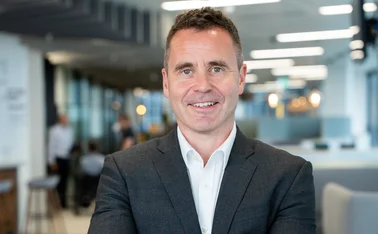
Analysis: Allianz’s acquisitive appetite

Need to know
- Allianz was reported to be one of seven parties interested in buying XL
- The German insurer lost out to Axa, which put in a bid of £11.51bn
- Allianz CEO Oliver Baete is reportedly still on the acquisition path
- Allianz has a number of mergers & acquisitions options open to it
- The insurer could look to snap up a target in the UK, or look further afield
With reports suggesting that CEO Oliver Baete has a big ticket acquisition in mind, rumours have been circulating that Allianz could look to hoover up one of the larger players in the UK market.
Allianz has only recently embarked on its £500m joint venture with LV, which saw it acquire 49% of LV’s business, with a further option for a full takeover in the future.
With a potential total price tag of £1.02bn, Allianz’s LV deal is not likely to put a stopper in its M&A pipeline.
Imas partner and M&A expert Olly Laughton-Scott said: “LV was a small deal for Allianz in the context of the group overall and is unlikely to stop it doing more.”
The Sunday Times reported last month that Baete was working with investment bankers on possible deals, with RSA, Zurich, QBE and Aviva under consideration.
When contacted by Post, Allianz declined to comment on “market speculation”.
In April, Allianz completed a buyout of trade credit insurer Euler Hermes, having spent a total of €1.85bn (£1.63bn) to retrieve all remaining shares in the insurer.
It was also reported to be one of seven parties sniffing around Bermudan XL Group, but it did not strike up a deal. Instead, XL was snapped up by Axa for a maximum of $15.35bn (£11.51bn), making the combined operation the largest P&C player in the global market.
Despite missing out, Baete may well have breathed a sigh of relief, as Axa’s share price tumbled post-acquisition and the ratings agencies reconsidered its outlook.
Axa’s share price continues to dwindle and there have not yet been signs of recovery. Baete, like the rest of the industry, will be closely watching for the outcome of Axa and XL’s strategic integration.
However, if the early knockdowns from Axa’s venture ought to serve as a cautionary tale, it appears Allianz is unphased.
Aston Lark CEO Peter Blanc put it: “Short term share price should never be taken as any kind of an indicator. XL Catlin being purchased by Axa was a long term strategic move and it might be quite a good one.”
Axa’s deal came shortly after AIG’s $5.56bn (£4.17bn) acquisition of Validus Holdings.
Allianz may yet follow the emerging trend and look to another target in Bermuda, rather than swallowing up one of its UK-heavy rivals.
Conservative pricing
Laughton-Scott believes it is “inevitable” that there is talk of Allianz as an acquirer so soon after Axa’s XL takeover.
Even for a global insurer with a market cap of €76.1bn (£53.71bn), the M&A path poses challenges and Allianz is not known for over-splashing the cash.
Laughton-Scott said: “Given Axa shareholders’ reaction to that deal, they will wish to tread carefully. There are things out there to buy, but the best businesses are going to be expensive and Allianz has tended to be quite conservative on valuation in recent years.”
It is possible that this is why it missed out on XL – Axa paid a 33% premium on the price of the shares on 2 March, the day before the transaction announcement. This was well above expectations for share values in the near future, a letter to XL shareholders reveals.
It reads: “The possibility that, if XL did not enter into the merger agreement, it could take a considerable amount of time and involve a substantial amount of risk before the trading price of the common shares would reach and sustain the $57.60 (£43.21) per share value of the merger consideration, as adjusted for present value.”
Size matters
A big bite could give Allianz a quick boost, but while the rumour mill will continue to churn around speculation of a big buy, it would not be a shock if Allianz had a different strategy in mind.
Laughton-Scott added: “It would not surprise me if it has its name mentioned in relation to lots of big targets, but end up doing some smaller deals on a more selective basis.”
Allianz could look to emerging markets for bitesize deals. Last August it bought 98% of Nigerian insurer Ensure, which generated €11m (£8.25m) in GWP in 2016.
In February it netted Sri Lankan general insurer Janashakthi Insurance for €85.9m (£64.43m).
It also dipped its toe into African reinsurance, having taken an 8% stake in Africa Re for £61m (£45.76m) in May of this year.
Acord research into insurer M&A over the past 10 years, looking at the 10 biggest life and 10 biggest property and casualty transactions per year, shows that smaller acquisitions might be more beneficial in the long run.
The study also showed that frequent flexing of takeover muscles might not necessarily set Allianz up for a smooth acquisition. However, so long as it focuses on due diligence, a bigger, riskier takeover could end up being a surprisingly slick transition.
Acord CEO Bill Pieroni told Post: “Large transactions – as measured by percentage of market capitalisation – created better near-term results, while smaller deals had a greater sustainable impact on returns. Smaller acquisitions seem to be more digestible and easily managed, improving long-term benefits.”
Pieroni added: “There were few learning curve implications for value creation through M&A – in other words, an insurer doesn’t have to make transactions in order to learn how to do them well. Instead, success was influenced by the relative size and risk of the transaction. Larger deals, with greater potential negative impact, tended to heighten the quality of due diligence, resulting in improved synergy realisation and subsequent value capture.”
Big ticket
The two biggest insurers that have been talked about as potential UK market acquisitions are Aviva and Zurich.
Zurich would be the biggest buy, with a market cap of £33.9bn and business across Europe and the US. Aviva comes in second, weighing in at a still-chunky £19.7bn.
Laughton-Scott said: “Zurich would a very big bite, even for Allianz. It would clearly be a transformational and very synergistic deal, with large businesses in Europe and the US.
“Aviva would seem unlikely – Allianz has hitherto shown no real interest in UK life business, which is the overwhelming majority of Aviva’s value. Aviva’s GI business may be of interest to it, but Aviva has shown itself to be firmly wedded to the composite model.”
The smaller fry
QBE’s £7.49bn or RSA’s £6.86bn market cap could be a more manageable proposition and lead to longer-term benefits.
However, while size-wise Allianz may find it easier to absorb RSA or QBE, it would still face challenges.
QBE has had a difficult 2017. Its UK arm took a £109m Ogden hit, while the group had a 104% combined operating ratio and posted a loss of £858m. This could put Allianz off, sources suggest.
RSA could be a better bet. However, a bid could bring a rival back to the table.
Zurich abandoned a bid for RSA in 2015, citing poor trading results as the reason for pulling out.
“A tilt at RSA could also bring Zurich back to the table and it is unlikely that Allianz would want to get into a bidding war,” Laughton-Scott said.
Laughton-Scott added: “RSA has been tidied up well and CEO Stephen Hester will not stay there forever – takeover at a premium would be an elegant exit for him. RSA is also a digestible size for Allianz and as well as the UK would bring good businesses in Canada and Scandinavia – but at the current share price, with a conventional takeover premium it would begin to look like an expensive acquisition.”
With Brexit uncertainty still abound, Laughton-Scott suggests that Allianz may not wish to wade into a UK transaction just yet.
Diversity in the market
An Allianz buy-in would not surprise Peter Blanc, but he highlighted that he would expect any purchase to be very strategic.
Blanc said: “Its financial muscle is such that any of those [Aviva, Zurich, RSA, QBE] could be suitable targets. Following Axa buying XL, Allianz globally are keen to stay in the hunt. It wouldn’t surprise me to see it on the acquisition trail, but that said, it is an incredibly sensible insurer. If it does a deal it would have to be a deal that makes sense strategically rather than financially.”
While Blanc believes brokers and customers need a range of choices, he does not seem too phased by the possible impact of an Allianz takeover on the market.
He said: “Brokers always like to see a diverse marketplace with plenty of choice for consumers. As long as it didn’t remove too much choice in the marketplace. We get on really well with Allianz. It is one of the good guys. So if Allianz were to buy something then generally we wouldn’t be unhappy about it, because it is a very decent insurer.”
However, he added: “But I’ll temper that by saying we would not want to see any meaningful reduction in competition, because it is helpful and it is good for the market to have plenty of players.”
Further reading
Only users who have a paid subscription or are part of a corporate subscription are able to print or copy content.
To access these options, along with all other subscription benefits, please contact info@postonline.co.uk or view our subscription options here: https://subscriptions.postonline.co.uk/subscribe
You are currently unable to print this content. Please contact info@postonline.co.uk to find out more.
You are currently unable to copy this content. Please contact info@postonline.co.uk to find out more.
Copyright Infopro Digital Limited. All rights reserved.
As outlined in our terms and conditions, https://www.infopro-digital.com/terms-and-conditions/subscriptions/ (point 2.4), printing is limited to a single copy.
If you would like to purchase additional rights please email info@postonline.co.uk
Copyright Infopro Digital Limited. All rights reserved.
You may share this content using our article tools. As outlined in our terms and conditions, https://www.infopro-digital.com/terms-and-conditions/subscriptions/ (clause 2.4), an Authorised User may only make one copy of the materials for their own personal use. You must also comply with the restrictions in clause 2.5.
If you would like to purchase additional rights please email info@postonline.co.uk








